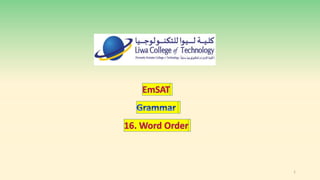
EmSAT GRAMMAR new theme.ppt
- 1. 1
- 2. 1. Subject verb agreement 2. Articles and determiners 3. Quantifiers 4. Intensifiers 5. Pronouns 6. Relative Pronouns 7. Prepositions 8. Verb Forms (Tense/ aspect/ voice) 9. Verb Forms (Infinitives/ gerunds, etc.) 10. Questions 11. Modals 12. Conditionals 13. Coordinating Conjunctions 14. Subordinating Conjunctions 15. Comparatives and Superlatives 16. Word Order 17. Parts Of Speech 2
- 3. 1. Elementary A1 Table of grammar contents – A1 – Test-English 2. Pre-intermediate A2 Table of grammar contents – A2 – Test-English 3. Intermediate B1 Table of grammar contents – B1 – Test-English 4. Upper-intermediate B1+ Table of grammar contents – B1+ – Test-English 5. Pre-advances B2 Table of grammar contents – B2 – Test-English 3
- 4. 4 1. Statement Subject He We Our aim The idea An eye 2. Verb is play has gone did (3.) (object/ complement) him the fan for it 4 . Main
- 5. 5 1. time Subject He We Our aim The idea An eye 2. Verb is play has gone did (3.) (object/ complement) him the fan for it Main
- 6. 6 1. time Subject He We Our aim The idea An eye 2. Verb is play has gone did (3.) (object/ complement) him the fan for it place Main
- 7. 7 Main
- 8. 8 Main
- 9. 9 Main
- 10. Word Order in Sentences
- 11. • The subject is one of the main two parts of a sentence. According to traditional grammar, a sentence consists of two parts: • a subject, • a predicate which modifies the subject. • Who: a person or a thing Example: Carol called. The bus returned. Subject
- 12. Verb • The verb describes the action performed by the subject. It goes after the subject. Example: Carol called. The bus returned.
- 13. Direct Object • The direct object receives the action of the verb and answers the questions What? or Whom? • The direct object should always stay with the verb. Example: Carol ate breakfast. The bus hit the tree.
- 14. Indirect Object • The indirect object answers the question "To whom?" or "For whom?". • The indirect object is the recipient of the direct object. • The indirect object is an object that often comes after a preposition. • The indirect object should always stay with the verb or direct object. Example: Carol gave the timetable to Julie .
- 15. Subject Complement • The subject complement is something that completes the idea of the subject of a sentence by giving more information about it. Usually, the subject complement is a noun, a pronoun or an adjective. • The subject complement should always stay with the linking verb (forms of verb to be, become, seem). Example: Jan is an excellent doctor.
- 16. Basic sentences 1. Subject + verb Carol laughed. The dog sits and eats. The flowers bloom.
- 17. Basic sentences 2. Subject + verb + direct object President Obama gave a speech. Jason told his mother. She wrote a letter.
- 18. Basic sentences 3. Subject + verb + complement Our house is old. Jason was tired. This song seem familiar.
- 19. Basic sentences 4. Subject + verb + indirect object + direct object I gave her my book. We offered them a drink.
- 20. Word Order Who What Where When How Why
- 21. Word order • Not every sentence will have all these elements, there will be a selection of them in each sentence.
- 22. Examples Who What Where When Why Carol ate breakfast on the train this morning because he was late. Who What Where Why The bus returned to the station to drop off the passengers Who What How The bus hit the tree with great force
- 23. From small to large • WHEN – time, day, week • The conference started at 10 am on Tuesday last week. • WHERE – place, city, country • They live in a flat in a big city in Jordan.
- 24. Exception • Sometimes a sentence starts with something else than the subject. The reason is emphasis. We want to stress this element by putting it at the front of the sentence. Your voice should emphasize it as well. • This morning, Carol ate breakfast on the train. • We use it only if it sounds natural!
- 25. Common mistakes Separating Subject from the Verb. We two years ago bought this car. We bought this car two years ago.
- 26. Common mistakes Separating the Verb from the Object. Sam ate slowly his meal. Sam ate his meal slowly.
- 27. Common mistakes Mixing the order of WHERE and WHEN. We drove at weekends to the seaside. We drove to the seaside at weekends.
- 28. Common mistakes Mixing the order of WHERE and HOW. He goes by train to work. He goes to work by train.
- 29. Common mistakes Mixing the order of HOW and WHY. They contact everyone because it’s easier by phone. They contact everyone by phone because it’s easier.
- 30. Common mistakes Mixing the order of WHEN and WHY. She went to town to post her letters this morning. She went to town this morning to post her letters.